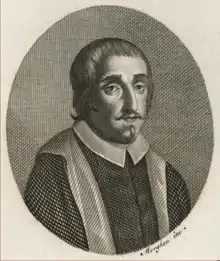Giuseppe Battista | |
|---|---|
 Engraved portrait of Giuseppe Battista, by Raffaello Morghen | |
| Born | February 11, 1610 |
| Died | 6 March 1675 (aged 65) |
| Resting place | San Lorenzo Maggiore, Naples |
| Occupations |
|
| Parent(s) | Cesare Battista and Macedonia Battista (née Fasano) |
| Writing career | |
| Language | |
| Period | |
| Genres | |
| Literary movement | |
| Notable works | Delle poesie meliche Epicedi eroici |
Giuseppe Battista (Italian: [dʒuˈzɛppe batˈtista]; 11 February 1610 – 6 March 1675) was a prolific Italian marinist poet and writer.
Biography
Giuseppe Battista was born in Grottaglie, between Brindisi and Taranto. When very young he lost his parents; but he was able to study both at his native place and later with the Jesuits in Naples. Here he came to the notice of Giovanni Battista Manso, who apparently took him to live at his own house. He became a member of the Oziosi; and was Manso's literary executor. After the death of Manso (1645) Battista spent some time with the Prince of Avellino, and then withdrew to his native village, where he lived a simple literary life. Though greatly troubled by physical ailments, he made frequent journeys in southern Italy. He died at Naples, March 6, 1675.
Critical assessment
Battista published extensive collections of verse, the Latin Epigrammatum centuriae tres (1653), and the Italian Poesie meliche (in four parts, 1653–70), and Epicedi eroici (1667).[1] His poems were once admired; they fitted the taste of their day. Girolamo Tiraboschi finds Battista 'a bad poet, who united in himself all the faults of his age,' but admits that his treatise on Poetry (1676) was influential. According to Benedetto Croce Battista was, together with Giuseppe Artale, the founder of a school of poetry aiming at going further the baroque in its quest for novelty. 'Giuseppe Battista was the leader, Giuseppe Artale the second in command of that sort of "baroque of the baroque" which flourished in the second half of the seventeenth century.'[2]
Battista appears to have been on friendly terms with Pietro Alois, Lorenzo Crasso, Pietro Michiele, and Giovanni Francesco Loredano.
Works
- Battista, Giuseppe (1653). Delle poesie meliche. Venice: Francesco Baba.
- Battista, Giuseppe (1659). Epigrammatum centuria prima (in Latin). Venice: apud Baba.
- Battista, Giuseppe (1667). Epicedi eroici. Venice: Combi, & La Nou.
- Battista, Giuseppe (1675). L'Assalone. Venice: Combi, & La Nou.
- Battista, Giuseppe (1676). La poetica. Venice: Combi, & La Nou.
Notes
- ↑ Slawinski 2002.
- ↑ Benedetto Croce, Saggi sulla letteratura italiana del Seicento, 3d ed., p. 401.
Bibliography
- Hutton, James (1935). The Greek Anthology in Italy to the Year 1800. Ithaca: Cornell University Press. p. 270.
- Girardi, Enzo Noè (1965). "BATTISTA, Giuseppe". Dizionario Biografico degli Italiani, Volume 7: Bartolucci–Bellotto (in Italian). Rome: Istituto dell'Enciclopedia Italiana. ISBN 978-8-81200032-6.
- Slawinski, M. (2002). "Battista, Giuseppe". The Oxford Companion to Italian Literature. Oxford University Press. Retrieved 8 June 2023.
- Snyder, Jon R. "Truth and Wonder in Naples circa 1640." In Culture and Authority in the Baroque, ed. Massimo Ciavolella and Patrick Coleman, 85–105. Toronto, 2005.